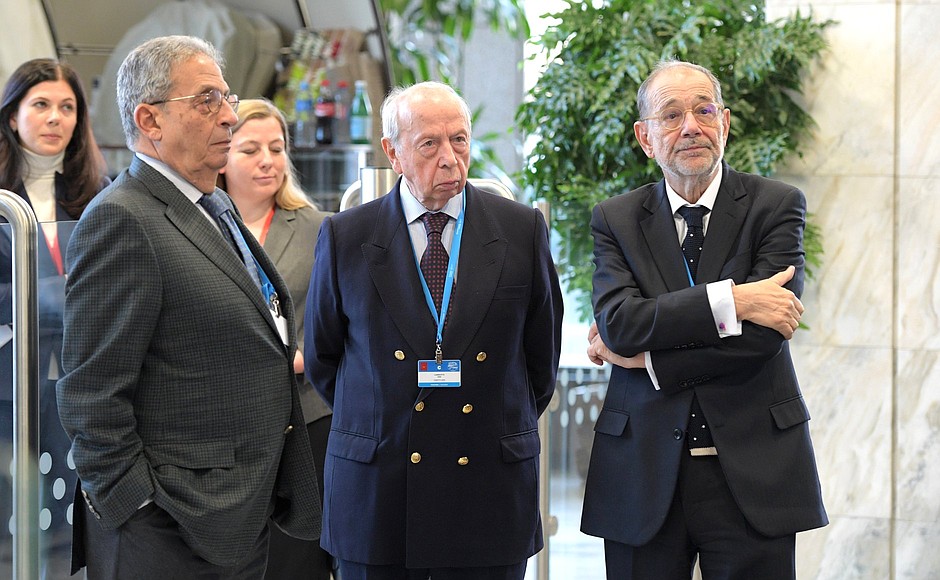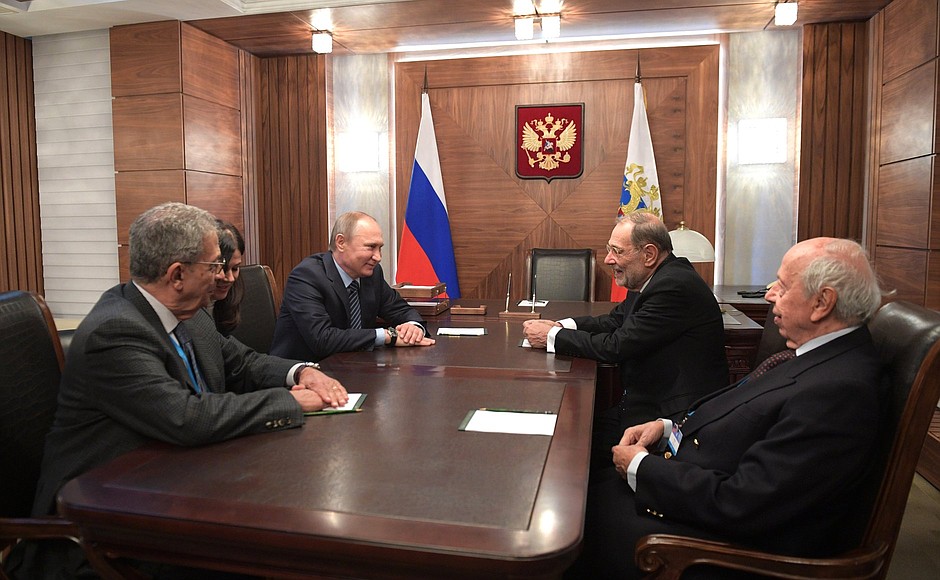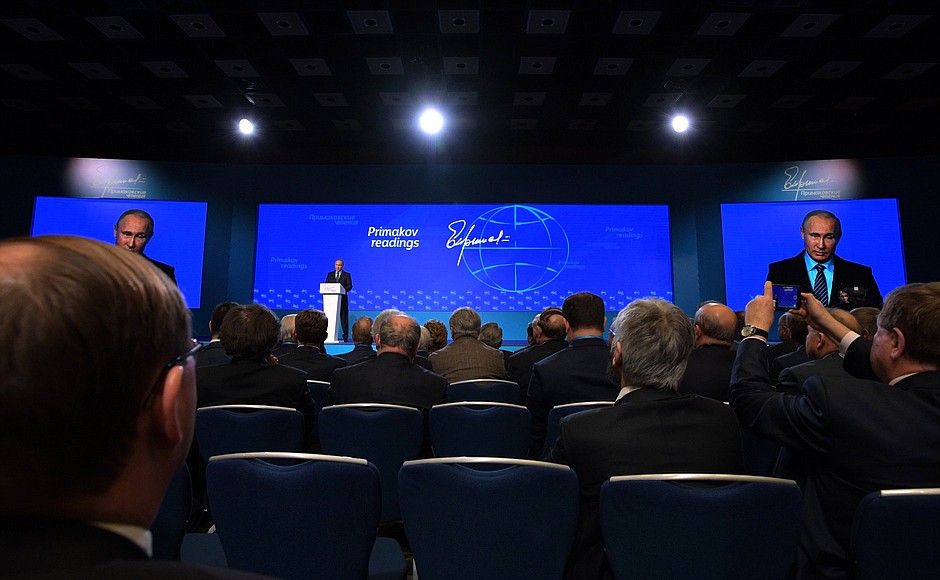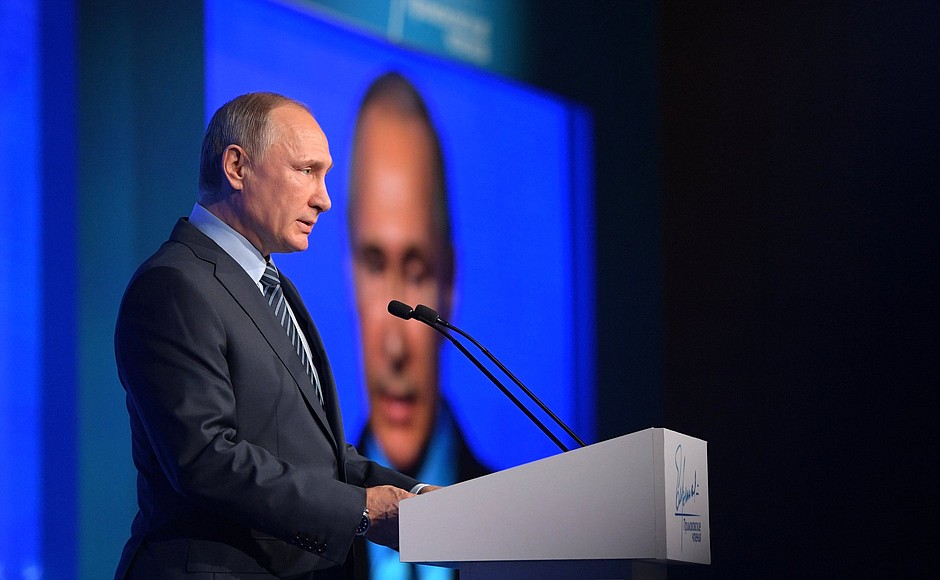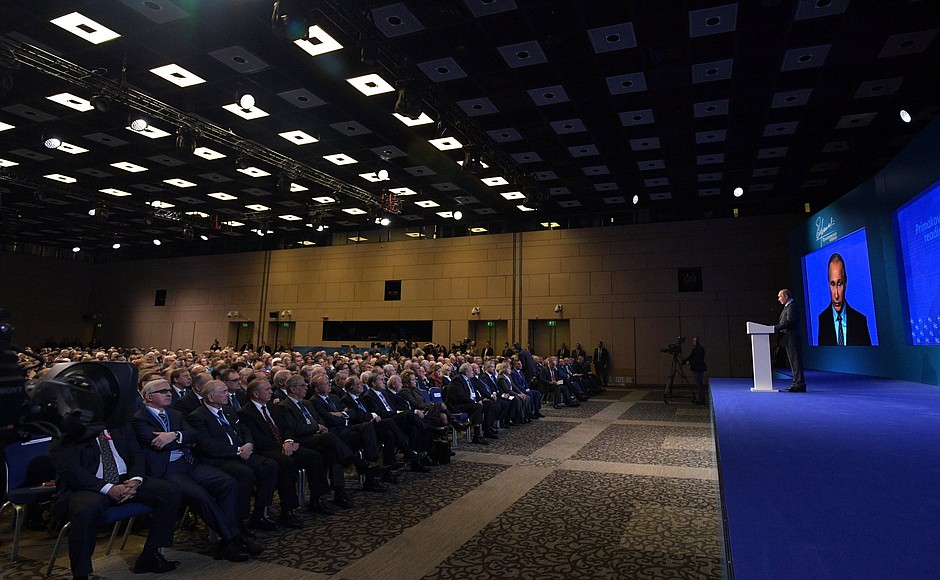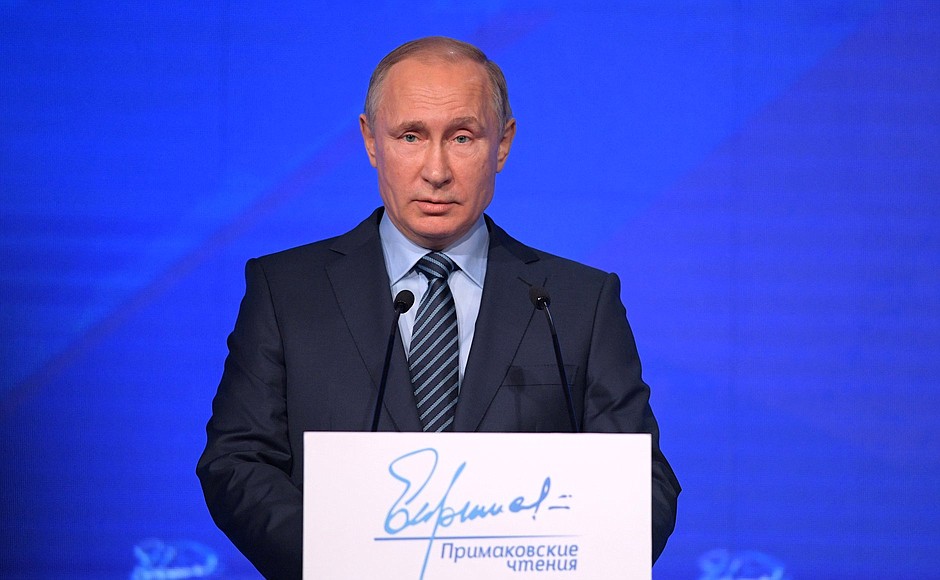The International Forum Primakov Readings took place on November 28–30 in Moscow with the support of the Russian Chamber of Commerce and Industry and the Russian Academy of Sciences’ Primakov Institute of World Economy and International Relations.
* * *
President of Russia Vladimir Putin: Mrs Primakova, ladies and gentlemen, colleagues, friends,
It is a great pleasure to greet everyone here at the Primakov Readings International Forum. This forum honours the memory and pays its respect to Yevgeny Primakov, outstanding statesman, diplomat, and scholar. It is now 18 months since Mr Primakov left us.
He was truly a person of great scale and many talents, open, responsive, considerate, and honest in his dealings with others.
It is no exaggeration to say that he was a great citizen of our country, a great citizen of Russia. It was absolutely natural and in the order of things for him to work for the good of his country. His effective defence of our national interests, patriotism, and selfless service to our homeland always earned him sincere respect, not only here in Russia, but abroad as well.
As a talented man and original thinker, Mr Primakov left a rich legacy that spans a broad range of fields – state building, academic research, foreign policy, economics, and journalism.
We all know that Mr Primakov was as a highly regarded individual and scholar both here in Russia and abroad. It was on his initiative that the Russian Academy of Sciences established a new department for global affairs and international relations.
He was an outstanding scholar of the Arab world, knew the Middle East in all its subtleties, had a profound understanding of the complicated processes underway there, and when he headed the Institute of Oriental Studies, he turned it into an influential intellectual centre.
Mr Primakov did much to strengthen the authority of the Institute of World Economy and International Relations that today deservedly bears his name. He arrived as a young post-graduate and rose to head the institute in the late 1980s, becoming its director. This prominent academic establishment marks its 60th anniversary this year and is conducting important research. The institute’s heads and staff rightly consider themselves Mr Primakov’s students and worthy successors of the traditions he began.
Mr Primakov avoided formalism, clichés and empty talk in his scholarly work. He always strived to think freely, make balanced and substantial conclusions and, what is particularly valuable, applied his broad knowledge to practice, in his life and work.
We can even speak of a particular method he developed, based on systemic situational analysis that makes it possible to take a comprehensive view of events in politics, the economy, and public life, forecast various development scenarios and propose the optimal action strategy in a particular area.
He used this method when he became Prime Minister of Russia at the height of the difficult crisis that hit the country in August 1998. I emphasise the fact that at this turning point in Russia’s history in the late 1990s, Mr Primakov took on responsibility for preserving civil peace and harmony.
We remember how production fell, unemployment grew, public sector wage arrears and economic debts continued to piled up, and the economy itself was sinking into recession. Few believed then that Russia could pull through this crisis and set itself on a growth track. But take a look at the development trajectory Russia took from there. It ensured the required high growth rates, freed itself from debt, built up large reserves, and is confidently building a modern, socially focused economy.
Later, as President of the Chamber of Commerce and Industry and the Mercury Club, Mr Primakov continued working actively on economic policy matters. He often spoke at events, proposed interesting and original ideas, and earned the business community’s great respect, as he always tried to understand the substance of the real problems business faced and find solutions.
He clearly formulated the Chamber of Commerce and Industry’s position on business development, and communicated it in a well-argued manner to the Government. He proposed effective growth models based on modernising industry and attracting new investment so that the state’s economic efforts would ultimately have a positive impact on the people’s quality of life and prosperity.
Mr Primakov used his deep knowledge, intuition, and managerial talent in the service of our country when he headed the Foreign Intelligence Service, and then the Foreign Ministry. At a difficult period for these agencies, he was able to bolster their influence, reinforce their human resource potential, and preserve and develop their best traditions.
As Foreign Minister, he put great effort into developing a modern foreign policy concept for Russia based on a clear understanding of this country’s real role in international affairs, resting on responsibility for stability and security throughout the world.
Mr Primakov always strove to act as a realist and a pragmatic. He took the view that diplomacy is the art of the possible, and that we should always seek compromise and respect our partner’s position. No matter how irreconcilable the positions of those who sit at the negotiating table are, they can and should find a mutually advantageous solution that suits all parties.
Resolving conflicts through peaceful means alone, and the inadmissibility of intervening in the affairs of sovereign states bypassing the United Nations Charter were also among the principles of international cooperation that Mr Primakov promoted.
Let us recall that Mr Primakov was one of the first to propose a solution to the Iranian nuclear issue, and all who were involved in resolving this problem know the role the different countries, diplomatic services and intelligence services played in this complex process. We know this role. We are not exaggerating anything here, but the fact remains that Mr Primakov was one of the first to propose a peaceful solution to the problem.
Among Mr Primakov’s other merits is coming up with the multipolarity concept. After the collapse of the Soviet Union and the end of the Cold War, a new unipolar world order began to emerge, but Mr Primakov had truly strategic vision that enabled to look into the future and see how unviable and one-sided this unipolar model was.
It was also his idea to develop close cooperation between the strategic triangle of Russia, China and India. This proposal was seen as something utopian and even harmful at first, but today, we see how quickly the BRICS group, which began in trilateral format, is gaining weight and influence in the world.
Many people have recognised Mr Primakov’s profound knowledge of the Middle East and his experience and intuition. I can say that I too always deferred to his views and assessments and trusted him as a wise diplomat. I would not say I instructed, rather, I asked him to carry out important and sensitive missions.
I would like to stress that he had great and unquestioned authority in the Arab world. Even before the so-called Arab Spring, Mr Primakov warned about the disaster that would ensue if the secular regimes in the Middle East countries were toppled. His words proved true, sadly. Unfortunately, the Middle East was plunged into a series of bloody conflicts and has become a hotbed of terrorism and religious extremism.
Today, we realise that effective cooperation between all the concerned influential international players is an essential condition for normalising the situation in the Middle East. It is following this logic that our initiative to form a broad front for fighting terrorism should be made reality. Unfortunately, this front has not yet been created, but there is no alternative.
I would like to note that Mr Primakov always argued the need for close ties with our partners in the Commonwealth of Independent States. He considered efforts to advance integration in new conditions and on this new basis as particularly important. This approach forms the backbone of our integration policy in Eurasia. We pursue this work in the Eurasian Economic Union, which is based on the World Trade Organisation’s principles of openness and free trade. We hope that talks with our partners, including those on linking up with China’s Silk Road Economic Belt project, will enable us to build a big Eurasian partnership.
Mr Primakov always held the view that Russia needs normal, constructive and good relations with Western countries. When asked, “Is it possible to be friends with everyone in the world?” he answered, “No, but we can and should work with them. The world is a very complicated place”.
Incidentally, it was thanks to the negotiating team headed by Mr Primakov that the Russia-NATO Founding Act was signed in May 1997, which was the precursor to the Russia-NATO Council.
Mr Primakov also believed that it would be very difficult to adequately address today’s big challenges without a serious partnership between Russia and the United States. Sadly, Russia-US relations have deteriorated considerably over these last years, but this is not our fault. Now that the election campaign is over in the United States and a new president will soon enter the White House, we hope that this will create an opportunity to improve these relations, which are so important not only for our two peoples, but also for ensuring international stability and security. During my recent telephone conversation with Mr Donald Trump, we agreed that something must certainly be done about the current unsatisfactory state of bilateral relations. As I have said, our country is ready to cover its part of the road.
I would like to conclude by noting one further important moment. Mr Primakov always surrounded himself with talented people and true professionals. He was a mentor and an older friend to them, helped promising people and colleagues on their career path and rejoiced at their successes. No matter where he worked, Mr Primakov always put together a strong team capable of continuing his work, and his legacy therefore consists not only of the works and ideas that remain relevant today, but even more so of the people, students, followers and successors in the broad sense, who had the good fortune to work with him, be friends with him, and learn from him. Many of them are here today.
I would like to thank you for your attention and wish you great success for the good of our country and in the cause of building good-neighbourly and cordial relations with all of our partners. I want to wish you personal success. Thank you very much for your attention.
